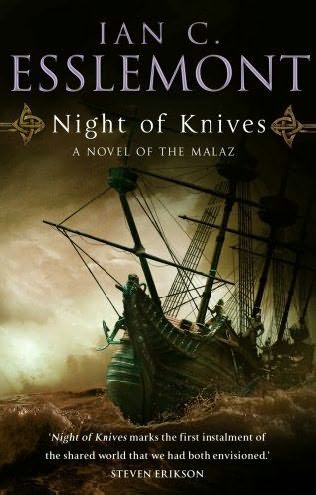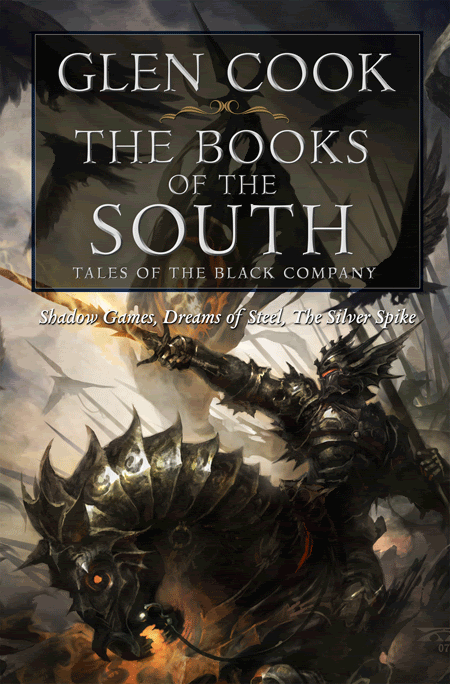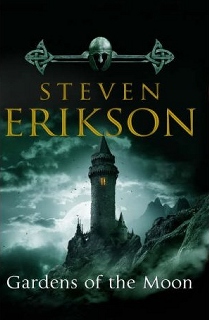 Night of KnivesBy Ian C. Esslemont
Night of KnivesBy Ian C. Esslemont(Bantam Books, mass-market paperback 2008)
With the success of
Steven Erikson's Malazan Book of the Fallen novels, and the plaudits his writing has earned, it's easy to forgot that the
Malazan world was co-created by
Ian C. Esslemont, who was
Erikson's gaming and screenwriting partner for many years.
It's therefore fitting that
Esslemont's first foray into the world he co-created has finally received a mass-market release, after originally being published in hardback by PS Publishing, a small UK press.
Esslemont however was faced with a problem that 99% of first-time writers don't have: a large, hungry readership with high expectations. This put him at a disadvantage right from the start, and the unavoidable comparisons with
Erikson's own novels meant that
Esslemont's debut offering was sadly never really going to be assessed on its own terms.
Comparing Night of Knives to
Erikson's established novels, is in my opinion, both subjective and unfair. Yet at the same time, given that
Esslemont is writing about places and characters that have appeared in
Erikson's own works, it is to some extent unavoidable. In this review therefore, I shall
endeavour to be as objective as I can but there will be times when comparisons are made.
Night of Knives focuses on an event that has previously only been hinted at by
Erikson - the assassination of the Emperor
Kellanved and his companion Dancer, by the would-be Empress Surly. Set over the space of a single night, the action takes place on the backwater Isle of
Malaz, during a once-in-a-generation event: the Shadow Moon. As dark beings stalk the streets and the barrier between worlds is blurred, a brutal conflict breaks out between a number of factions...and the events that unfold will change the world. Into this
maelstrom of treachery and deceit come Temper, a war-weary veteran, and
Kiska, a young thief and would-be Imperial spy.
Straight away you can see that
Esslemont's writing is very different from
Erikson's.
Esslemont writes with a real sense of urgency, and his style is more accessible and less dense. It's also, if I'm honest, not as good as
Erikson's.
Esslemont is by no means a bad writer; his action scenes pack a punch and he can conjure up some nice
atmosphere with his descriptive prose. However there's just not as much going on beneath the surface as there is with
Erikson.
Esslemont doesn't manage to convey the sense of history of the world or the importance of the unfolding events as well as
Erikson does in his own work. In addition, some of the dialogue is a little stilted at times and some of the language is repetitive. To some extent I think
Esslemont was held back by the plot, which doesn't really allow for much variation in the locale. It's no coincidence, to my mind, that the best writing in the book is in a flashback chapter, detailing a well-known siege and the events the
occurred there. When given the chance to do something more epic in this chapter,
Esslemont manages to deliver much more convincingly. This definitely bodes well for his next book,
The Return of the Crimson Guard, which should give him plenty more scope.
Esslemont's characterisation in Night of
Knives is hit and miss. Temper, the weary veteran, is a well-rounded character who is easy to sympathise with and whose background is sufficiently explored.
Kiska, on the other hand, is a rather shallow character whose sole purpose in the book seems limited to constantly getting captured by the various factions, and then expressing her irritation at her own limitations. While Temper has a reason to get involved in the night's proceedings (old scores to settle),
Kiska is a bit of a spare part with no real point as to her involvement, other than to explain her background a bit, as I understand she appears in
Erikson's later novels. Her character is at times unconvincing. For example, there's one scene where she "forces down some bile" as she witnesses a soldier get torn up by a shadow hound, before the beast then chows down on him. That just isn't realistic at all. She's a teenage girl with no real survival or combat experience, for goodness sake. Yet she handles the situation like a seen-it-all veteran. Unconvincing to say the least. The two protagonists aside, we do get to see some other
familiar characters from
Erikson's books (I had a bit of a 'geek' moment when
Hairlock made an appearance). Generally however
Esslemont's characters are just not as appealing as
Erikson's; they aren't as world-weary, or as cynical, or as wryly amusing.
There's no doubt that
Esslemont tells his story well enough, and the plot does allow for one or two twists and surprises. There are certainly a number of important events, and some very cool aspects (I loved the Riders, for example, and am looking forward to reading more about them in
Erikson's The
Bonehunters). The pacing of the novel is probably its strongest part. It is disappointing however that the two most important confrontations of the novel both occur 'off screen' and so subsequently we don't get to witness them. It doesn't defeat the point of the novel, but it certainly lessens the intensity of the story's impact on the reader. One or two of the plot's more minor events do come across as a little contrived. For example, when a brash young soldier threatens Temper and his companions, it seems the only point of the soldier's actions is to give Temper a route out of the situation he finds himself in.
Given Esslemont's more accessible writing style, I thought that perhaps Night of Knives would be a better starting point for newcomers to the Malazan world, rather than Gardens of the Moon. Having read both books, I firmly believe Malazan virgins should start with Gardens. It is likely that if you read Night of Knives first, much of the importance of the events will be lost on you. Plus you probably wouldn't have a clue what was going on. In any case, Gardens is a superior novel in every respect.
Overall, Night of Knives is a decent novel with good pacing and one or two solid characters. There's plenty here for Malazan fans to get their teeth into. It's let down though by some weak characterisation and one or two problems with the plot. As harsh as it may sound, you do kind of wish that
Erikson had written this book.
Erikson makes it clear in his foreword that
Esslemont's book isn't
fanfic, but at times it does feel a bit like it. Perhaps this is to be expected when an author writes a story in the same world as a more established, popular writer. In any case,
Esslemont has shown enough in Night of Knives to convince me that there is more to come from him, and hopefully his next work will be a more
convincing example of his ability.
Verdict:
dddRecommended for fans of: Steven Erikson





 Another article on recommended reading is admittedly long overdue, and as George R. R. Martin topped the recent poll of 'Best F/SF authors' on
Another article on recommended reading is admittedly long overdue, and as George R. R. Martin topped the recent poll of 'Best F/SF authors' on  Went into Waterstones to pick up The Briar King by Greg Keyes, after having heard many good things about that series.
Went into Waterstones to pick up The Briar King by Greg Keyes, after having heard many good things about that series.
 The Black Company
The Black Company
 I nearly wet myself when I read this. Well, that's not true. But I may have squealed a bit. Like a pig.
I nearly wet myself when I read this. Well, that's not true. But I may have squealed a bit. Like a pig.


